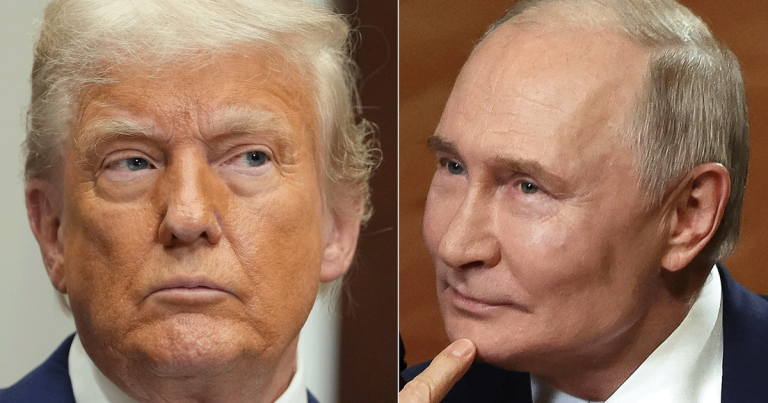
Some knots tighten the more you pull at them—something the foreign policy “experts” never seem to grasp. After orchestrating a ceasefire between Israel and Hamas that brought together 59 nations in agreement, President Trump has turned his attention to an even more tangled conflict. The war in Ukraine, approaching its fourth anniversary, presents a different challenge entirely—one where personal animosity may prove harder to overcome than military strategy.
Fresh from his Middle East diplomatic victory, Trump met with Ukrainian President Volodymyr Zelenskyy at the White House on Friday, following a pivotal phone call with Russian President Vladimir Putin the day before. The president’s assessment of why this conflict has dragged on for nearly four years cuts straight to the heart of the matter.
“They have tremendous bad blood,” Trump revealed during the Zelenskyy meeting, speaking about the Ukrainian and Russian leaders. The admission marks a stark departure from typical diplomatic language that focuses on territorial disputes or security concerns.
From ‘Fox News’:
“They have tremendous bad blood. It’s really is what is holding up I think a settlement. I think we are going to get it done and we have to make it long-lasting, as I said in the Middle East, everlasting.”
This personal diagnosis of the conflict’s core problem came as Trump confirmed plans to meet Putin in Budapest, Hungary—their second face-to-face meeting this term. The president characterized Thursday’s phone call with Putin as making “great progress,” though specifics remain under wraps.
The Tomahawk Card
Behind the diplomatic pleasantries lies a more forceful strategy. Trump has openly discussed using America’s sophisticated Tomahawk missiles as leverage, telling reporters earlier this week he might warn Putin: “Look: if this war is not going to get settled, I’m going to send them Tomahawks.” These weapons, capable of precision strikes from 1,000 miles away, could fundamentally alter Ukraine’s ability to target Russian military and industrial sites.
The Kremlin has already expressed “extreme concern” about this possibility. (You think Putin’s sweating a bit? I do.) Putin reportedly told Trump that Tomahawks “won’t change the situation on the battlefield, but they will cause significant damage to relations between our countries.” Defense Secretary Pete Hegseth amplified the pressure Wednesday, promising that “firepower” was coming for Ukraine, though he stopped short of specifics.
Zelenskyy, for his part, sees opportunity in Trump’s momentum. “President Trump has really showed for the world that he can manage a ceasefire in the Middle East,” the Ukrainian leader said Friday. “And that’s why I hope that he will do this.”
Breaking Through the Stalemate
Look, what we’re witnessing here isn’t just another round of diplomatic meetings—it’s a fundamentally different approach to conflict resolution. Where previous administrations relied on sanctions and strongly-worded statements, Trump is applying the personal touch that worked with Middle Eastern leaders to Eastern European adversaries who genuinely despise each other.
The president’s frustration is palpable. Having boasted he could end the war in “one day,” he’s now admitting it’s “a hell of a lot trickier” than the Gaza negotiations. But that honesty might be exactly what’s needed. By acknowledging the personal vendetta between Zelenskyy and Putin, Trump is addressing what everyone knows but few diplomats dare mention.
This echoes Reagan’s approach with Gorbachev—and before the establishment types roll their eyes, let me remind them who actually won the Cold War. Sometimes breaking through requires acknowledging human emotions, not just geopolitical calculations. The Tomahawk threat isn’t mere saber-rattling; it’s Trump reminding Putin that personal feelings can’t override American interests forever.
The coming Budapest meeting will test whether Trump’s blend of personal diplomacy and military leverage can overcome what he correctly identifies as the real obstacle: two leaders whose mutual hatred has cost thousands of lives. If he succeeds, it won’t just end a war—it’ll prove that American leadership still matters when the world’s toughest conflicts need untangling.
Key Takeaways
- Trump identifies “tremendous bad blood” between leaders as the real obstacle to peace
- Tomahawk missiles emerge as America’s leverage card against Russian intransigence
- Personal diplomacy succeeds where bureaucratic approaches have failed for years
- Reagan-style leadership proves American strength still shapes global outcomes


